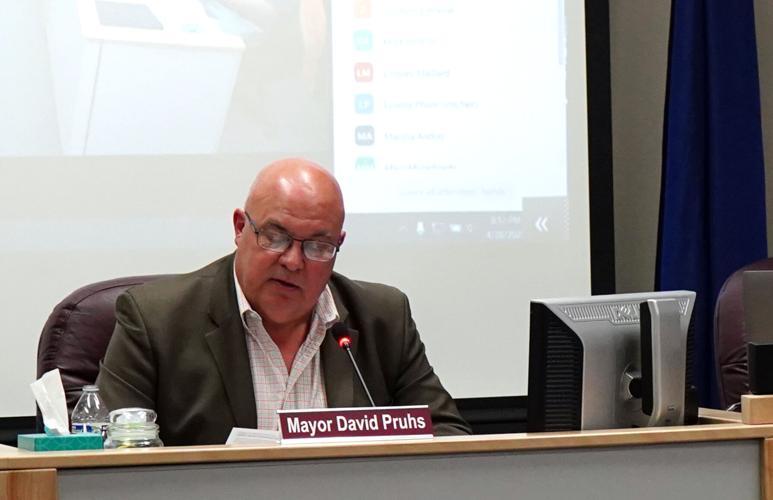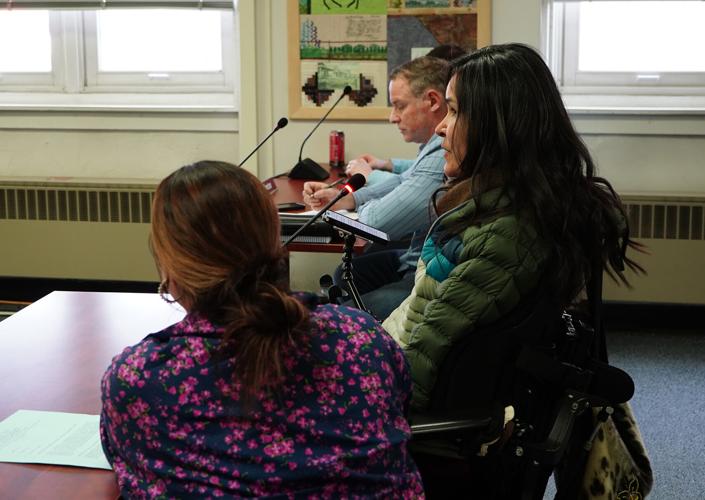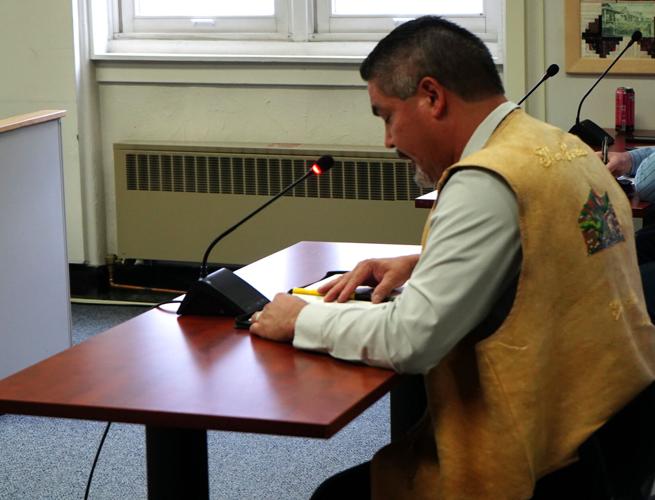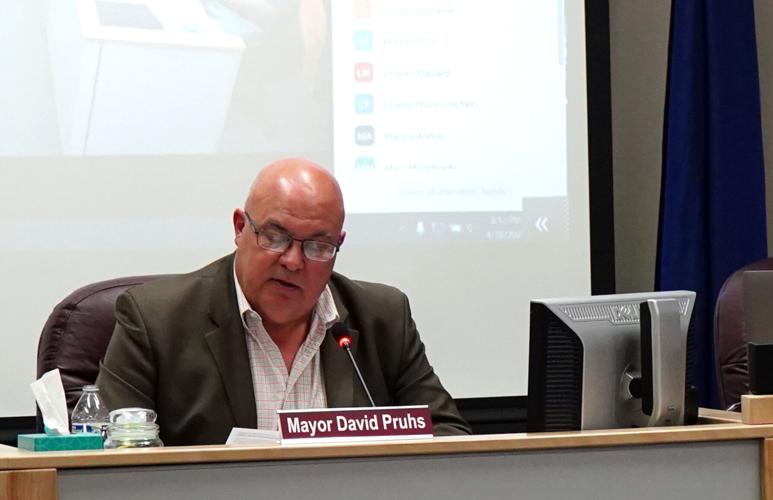City of Fairbanks Mayor David Pruhs issued a formal apology on Monday over a Facebook post that drew criticism from Alaska Native leaders, who called the statements harmful and divisive.
Pruhs wrote the post following a Friday morning walkthrough of Golden Heart Plaza, in which he referenced the returning summer police foot patrol, clean-up efforts, and installation of a public toilet. However, his post referenced that as the temperatures warm, “more people come in from the villages or come out of shelters to live their life style. We operate downtown on behalf of Fairbanks residents, because we live here, not for visitors.”
Pruhs’s post drew sharp rebuke from the Fairbanks Native Association and Tanana Chiefs Conference, who issued separate statements condemning the post and calling it reprehensible and offensive to Alaska Natives.
Pruhs said at Monday’s meeting that he wrote the post after seeing an offensive statement on Facebook that “horribly critiqued” Golden Heart Plaza, disparaged its appearance, the people who utilize it and the city’s upkeep of it.
Pruhs acknowledged that he should have written the part about the villages better.
“I did not mean to insult or denigrate anyone,” Pruhs said. “I realize my sentence could be construed as very insensitive, please don’t take it as racist as it was not my intent. I do apologize for these words.”
More than 20 people testified at Monday’s city council meeting, nearly all calling out Pruhs.
TCC Chief and Chairman Brian Ridley said Pruhs should have immediately removed or clarified his post after the backlash was made clear. Ridley said the post “deeply hurt our people” and unfairly singled out rural Alaskans, who are mostly Alaska Natives, “and framed as a problem.”
He added that Alaska Native organizations and corporations contributed nearly $600 million to the Interior Alaska economy.
Ridley said Pruhs’s statement was a step back in the slow progress he believed Alaska Native organizations had been making to combat racial profiling.
“It demonstrates how fragile that progress remains,” Ridley said. “I appreciate that you have acknowledged and expressed willingness to learn, but accountability isn’t just about words after the fact; it’s about action in a moment when it matters most. Leadership means ensuring people from all walks of life feel safe, respected and valued, not just when it’s convenient.”
FNA board president Sharon McConnell said Pruhs’s post is “unbecoming of a leader.”
“Such words divide people, they single out people and groups rather than uniting people,” McConnell said.
McConnell added that village residents visit Fairbanks for several reasons, including medical appointments and shopping. Organizations like FNA and TCC provide services and employment that “benefit this city and this economy.”
“I would hope that the Fairbanks City Council really reflects on this situation and takes action,” McConnell said.
Fairbanks resident Teisha Simmons said Pruhs and other leaders should strive to be aware of any biases they might hold. Simmons said she was worried such biases would reinforce negative stereotypes about Alaska Natives.
“As a leader, comments like that also give permission for others to think about us that way and treat us that way,” Simmons said. “It took a lot of effort on my part growing up and becoming an adult to overcome internalized shame from comments I heard from kids in the community who were hearing things in their homes.”
Fairbanks resident Bobby Dorton said he was torn by the mayor’s post. He noted the city’s programs, including its re-entry program, have helped him, and that former mayor Jim Matherly invited him to sit on the city’s diversity council.
He encouraged Pruhs to come “out of his comfort zone” and move forward in a united front.
Several members shared testimony or stories of how similar words and stereotypes impacted them growing up, how Alaska Natives make at least 16% of the state’s population.
Some were not so moved by Pruhs’s apology or explanation. Former TCC president William “Spud” Williams called for Pruhs to resign or be removed from office.
Following public testimony and Pruhs’s apology, Williams told a small crowd FNA and TCC’s response should be “apology not accepted.”
Pruhs told residents Monday that he hopes to see it as an opportunity to rebuild bridges.
“We are going to be putting together a group, mainly of Natives and myself, and talk about racism, drugs, colonization, and these issues,” Pruhs said. “I will learn, I will help.”
Pruhs also noted in the future he may likely leave such posts to a public information officer.
“I hope you understand that I had no malicious intent or bad intent,” Pruhs said. “I was sticking up for the town, the community and everyone in Fairbanks, whom I cherish deeply,” Pruhs said.
Following the meeting, Ridley, TCC’s chief, said he’s trying to stay positive.
“I think it’s a start, it’s a step in the right direction,” Ridley said. He hopes the issue will foster new conversations and meetings with tribal leaders and the city.
“If nothing else, I hope this brings back the meetings with native leadership to mend some of these things ... I think actions and time will tell,” Ridley said. “Sometimes, all leaders rush to respond to things.”
Ridley added it’s how Pruhs “leads from here forward that will be telling.”
McConnell, FNA’s board president, said she appreciated Pruhs’s acknowledgment of the misstep. Like Ridley, she hopes it’s an opportunity to restart conversations with FNA and TCC. She noted that workshops with Denakkanaaga and Fairbanks police officers, where officers learn to make hats with Native elders, are a prime example of building a better understanding.
However, she noted that Pruhs needs to understand that words have consequences.
“Hopefully, he’ll be more thoughtful as a leader in the community on how he responds and to how he words his responses ... he is a leader and he should not be writing spur of the moment,” McConnell said.
While she declined to offer potential outcomes, she said the city council should carefully consider its options.
“We hope there is some action, because there should be some consequences for things that occurred because of his comments,” McConnell said. “Going forward, it’s important that our Native organizations work with the city because there’s always room for improvement.”
Councilmember Lonny Marney said Monday night that the public testimony reinforced the need for open conversation.
“It’s been a red herring for so many years that no one wants to touch it,” Marney said.
Valerie Therrien said she doesn’t receive those Facebook posts but that it’s “important we take this very seriously.”
“As I have said to the mayor, we really need to work with the Native community,” Therrien said. “It’s such a sensitive issue.”




